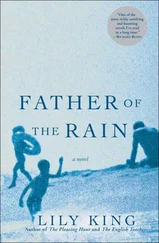She was aware of having left the highway, of being on slower roads, of the car moving with sudden purpose: a left turn, a long straightaway, a right turn. The car hit gravel and stopped. All she could see was the upper half of an orange house, a small strange house, a playhouse maybe that had been shaped from clay by a child. She shut her eyes.
One thing she admired about Hardy was the inevitability of his tragedies. He was right up there with the Greeks, the way Tess for example picked up steam. You felt the first spasm of motion in the very first scene, then with each subsequent scene the tragedy gathered power. But life itself was nothing like that. In life the lack of inevitability — the lack of any design at all — was the tragedy.
“I told you you wouldn’t call first.” She knew that voice. “Didn’t I tell you that?”
Gena. No! She kicked the seat in front of her. But Peter was already out of the car, his feet scuffling through the gravel. No! Not here. Please dear God not here. She tried to get back to her thoughts — she still had something more to think about Hardy and design — but Gena was crying, then snuffling, then saying, “Come in. Are you hungry? Come in.”
And Vida was left outside in the car like a dog.
“You’re not all that surprised we’re here,” Peter said.
“Tom’s been calling about every hour practically. All we could do was hope you’d turn up somewhere.”
Peter was aware of a strange lack of disappointment in not having surprised her. It just felt good to be here.
“Though I didn’t expect you’d be the one driving.”
He laughed.
“Sit,” she said, pointing to a foldout chair, the only chair at the small kitchen table. Gena stood at the sink, looking through the window. “You really think she’s asleep?”
“I don’t know and I’m not sure I really care at this point.”
“It’s been a rough few days, hasn’t it?”
“Yeah.
“Has she eaten?”
“About six onion rings and a french fry.”
“Water?”
“A few sips.”
“Alcohol?” Tom must have told her about that.
“No. But she was drunk when we started out.” Peter felt the room moving past him, like a highway, and stood up. “I don’t want to get in a car for a long time.”
He went into Gena’s living room. For all the sunlight outside, the house was buried in darkness. He felt like turning on a light. He walked around the room slowly, though there was little to see, just a brown flowered chair facing a television. He heard scratching beneath it and squatted to lift the skirt of the chair. It wasn’t a cat that bolted out past his feet to the kitchen.
“What was that?”
“You’ll have to meet all my babies.” She scooped up something brown and white at her feet. It was a guinea pig. “This is Fluffanutter.”
Peter tried to stroke the top of its quivering head but it quickly tucked itself into Gena’s elbow. “They’re all going to be a little shy at first.”
It was too much of an effort to stand, so he sank into the brown chair. Gena dragged the metal chair from the kitchen and sat beside him.
“Either you drove a hundred miles an hour or you didn’t sleep much.”
“I didn’t sleep much.”
“I should call Tom. Do you want to talk to him?”
Peter shook his head. He didn’t really believe the Belous still existed. That chapter of his life was over. He knew he should get up and check on his mother; the car would be getting pretty hot. But he didn’t have the strength. He shut his eyes and highway lines rushed past. Someone laughed, Fran or Stuart. A huge yellow ribbon was being tied in a bow. He was in history class, in the front row, away from the window, and Kristina was unzipping his fly. His erection jerked him awake. But Gena wasn’t looking. She was on the phone in the kitchen, facing the window. She was speaking quietly but not whispering. He heard “… exhausted but otherwise fine … yes … yes, I know.”
He remembered Stuart’s trip with his mother, and Tom’s worry back at home. He wouldn’t be feeling anything like that now, not for a wife of a few weeks, not for a boy he’d done a little woodworking with, that was all. He’d been so stupid to think the Belous would become family, that you could press people together and they’d stick. Look at him and his mother. They’d been pressed together all his life and they still weren’t a family. He’d always thought that was because two was too small a number for a family, but that wasn’t it. He knew now that wasn’t it.
“Oh God,” he heard Gena say. “Peter. Here.” She held the phone out as far as it would reach.
“What?” He didn’t want to get up.
“Talk to him. I’ve got to go get your mother. She’s walking away.” She put the receiver down on the counter and went out the door. He could hear the gravel being thrown in the air behind her as she ran.
He lifted the phone to his ear. Out the window he saw his mother, still in her trench coat, hobbling toward the road.
“Hello?” he said as Gena caught up to her.
“Peter?”
“Yeah.”
“You’re okay. Thank God you’re okay.” There was all sorts of emotion in Tom’s voice. He pressed the receiver closer.
“I’m fine.” His mother kept walking and when Gena tried to take her arm she flung it away, just as she’d done to Peter for the past few days. But she was no match for Gena, who stood in her path and clutched her by both shoulders.
“Are you still there?”
“Yeah. I’m just watching.” He was so tired. He hadn’t meant to say that.
“Watching what? TV?”
“No. Gena and Ma. I’ve never seen women fight before.”
“They’re fighting?”
“Wrestling.”
“Wrestling?”
“They’re in a sort of lock right now. Gena’s heavier so you’d think she could just shove her down, but Mom’s got the height.”
“Peter, is your mother okay?”
“I don’t know. I found her on the JV field that morning. I had to carry her.”
“I’m so sorry.” From the way he said it, Peter could tell he already knew that part.
“They’re down.”
“They’re done?”
“Down. On the gravel.”
At first Peter thought his mother was laughing. Her mouth was open wide and her arms were wrapped around her stomach as if so much laughing hurt.
“What’s she doing now?”
“She’s laughing.”
After a long time, Gena led her into the house.
“I’m going to run your mama a bath.”
“All right,” he said loudly, cheerfully, hoping his mother would look up. But she didn’t. She was watching her feet move along the floor. Her tights had holes in the toes now. Her trench coat was bent up in the back. Her whole body seemed as delicate and precarious as a dried leaf. He wasn’t on the phone with Tom anymore, though he didn’t remember saying good-bye.
From the flowered chair he could hear Gena’s voice above the rush of the water into the tub. The faucet stopped running and there was only the sound of water tinkling as his mother stepped into the bath.
Gena’s face was pink and glistening. She sat on the metal chair again and put a hand on his knee. There were no more noises from the bathroom, not even a few drips from an arm reaching for soap. Could you really drown in a tub? Wouldn’t your head, after you went unconscious, bob up automatically and gulp for air?
“She’s going to be all right, honey, she really is.”
If his mother died would he start looking for his father? Whenever he thought of finding his father the same image always came to mind, of a man outside a small unpainted house, raking leaves. The man had a kind flat face and wore a wool sweater. He was lonely and distracted, and even in his dreams Peter couldn’t get his attention when he called to him.
Читать дальше












